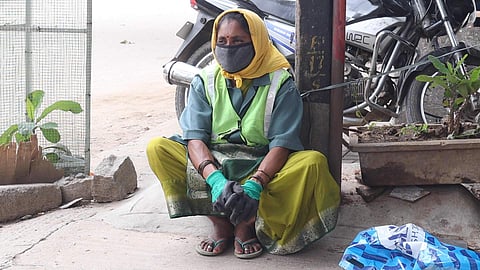

While we were cooped up in our homes, some of us still are, it was business as usual for them. Up at the crack of dawn and out on the streets to clean the filth left behind by us from the day before. If they came too close to us, we would recoil fearing they are 'superspreaders'. If they knocked at our door asking for some water, we would shoo them away. Or out of some reluctant clemency, give them a bottle and ask them to keep it. If you know what we mean. During lunch, when they had a few minutes of peace, they would be forced to sit near the foul-smelling gutters or overflowing garbage bins, away from ‘civil society’. We aren't referring to just any frontline workers, we are talking about sanitation workers.
Sneha Menon and her Canon EOS M50 stood witness to all this and many more atrocities meted out to sanitation workers when the whole world was struggling through the pandemic. But it was not all dark and deep. Like the time when Narayanamma, a sanitation worker, would buy a beeda (betel leaf and areca nut that people chew on) from one particular seller every day. They weren't close friends and yet, the beeda seller would wait earnestly for Narayanamma who would do her boni (the first money a seller makes for the day, considered auspicious). "We push the sanitation workers away saying they are filthy and some of them wait to see them. It's just different perceptions of the same person assigned by society," says Sneha. So, the 26-year-old's debut documentary In God We Trust is not just about this dichotomy, but also about all those lesser-known and lesser-appreciated sanitation workers and all that put through during the pandemic and at the hands of the lesser humans amongst us.
Associate Video Editor for Rakeysh Omprakash Mehra Pictures' Fanney Khan, Associate Director for Ameyukti Productions' Gantumoote (Kannada) and working as Video Editor and Director at guch (collaboration platform for video creation) being her latest post — life was going great for Sneha until she decided to quit last year and start a career as a documentary filmmaker, drawing ample inspiration from her idol, Iranian filmmaker Abbas Kiarostami. Then a Facebook post drew her attention to the predicament of sanitation workers.
Come May 2020, Sneha started talking to sanitation workers, sans her trusty camera initially. "Most of them wouldn't even wear masks or have one hanging around their chin. When I asked one of them about her mask, she said she gave it off to her son because he did not have one. Forget that, after a few conversations I realised some of them did not even know why they were being badgered to wear a mask, they simply did not know about the gravity of the virus," says the wide-eyed youngster. The attitude was such that they might be in the twilight of their life, but they will work to keep their household going. It wasn't about the survival of the fittest, it was about survival. Period! This compelled them to turn up to work no matter what mischievous virus was afoot or the way they were treated or their services regarded.
As a result, death was not something they feared, it was just something they expected. So when Sneha, realising their lack of awareness with regard to Corona, questioned them about their life, livelihood and what lies ahead, they would promptly say, 'Devaru iddare', meaning 'God is there' in Kannada. "In fact, that was their answer to every question I would ask when it comes to their health or the future," she admits exasperatedly. And this phrase is also where she drew the title of her documentary from, In God We Trust. You'll find the trailer on Vimeo (released about a month ago) and now, the film is currently touring film festivals. "They would keep repeating that God has been kind to them and has kept them safe so far and he would continue to take care of them, no matter what. Their church and weekly pastor visits to their home or their deity and pooja, it was their faith that kept them going through it all," explains the youngster about these workers who were usually from Tamil Nadu or the two Telugu-speaking states.
Though most women vehemently kept to themselves, tête-à-têtes with a few like Narayanamma kept her work going. This woman was about 50, lost her husband recently and was the sole breadwinner of her family. Another sanitation worker even invited Sneha to her humble home. "It was in the containment zone, but I went and was greeted by five members cramped in a small space. I was their first guest, they said. Ever," she shares emotionally. In another instance, a few sanitation workers were even introduced to Sneha's mother. Then there was the feisty and outspoken Vani, who would speak up against salary cuts or medicines, but would continue to turn up to work day in and day out because she wanted to take a loan to get her daughter married. In this way, the debutante documentary-maker spoke to 15 to 20 workers and very closely with five to six of them all while handling her hand-held camera.
After shooting in June and July, Sneha ended up with 5 GB of rushes that resulted in a crisp 23-minute documentary that looks like it's going to be the flavour of the festival season. Officially selected for Toronto International Women Film Festival and Tagore International Film Festival and having bagged a Critics' Choice Award at the Uruvatti International Film Festival already, she is off to a great start, isn't it? Not just that, she is no longer the same person as she was before the film. "All it takes is a smile and a few kind words to break barriers," she says profoundly. Perhaps we should all try that sometime.
